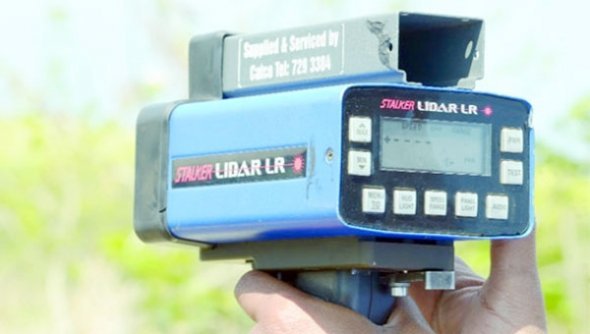Ticketed for Speeding: Are Mobile Radars Reliable?

Ramen Chocalingum, living Vacoas, was sentenced to an excessive speeding ticket Tuesday, June 4, 2013 at 12:25 in Palmar, Trou d'Eau Douce. He shares his story: "I'm a truck driver for nine years.
In this Tuesday, June 4, during my working hours, a policeman took me contrary, accusing me of having rolled 75 km / h when the speed limit was 60 km. The officer showed me his camera showed that 75 km / h. I have not agreed to Fixed Penalty, since my truck has a 'Speed limit' set at 60 km / h. I'm sure he had not done for speeding, "he said flatly.
The next day, he took steps to support his claim .. "The truck is also equipped with a GPS system. This allowed me to get the company that offers the full report of my trip and the speed at which I was driving all day June 4 service. This report actually shows that I have not driven more than 55 km / h, "he says.
The company in question, Island Communications Ltd, we contacted, emphasized that his GPS system would be developed. Argument supported by satellite photos and documents indicating the displacement and velocity of the truck.
In addition, one of the leaders of this company explains how speed limitation: "Given that this truck is equipped with a speed limiter, it is very unlikely that the driver could drive at 75km / h, especially this route without slope. With a speed limiter, if the driver exceeds the 60 km / h, there is an interruption of the fuel injection to the engine. Therefore, the driver can not accelerate and exceed 60km / h. Except in a steep slope when the vehicle is at a standstill. This situation does not apply in this case. "
Ramen Chocalingum account go through. "I recorded a statement to the police and I gave them the documents mentioned. In turn, they expect to submit the case to the Director of Public Prosecutions will decide if for prosecution or not. It was important for me to publish this case, because I do not want other motorists to be unfairly penalized because of this device, "he notes.
H. Gunesh (attorney): "Mistakes are possible"
Contacted by The Daily Challenge, the attorney H. Gunesh calls into question the effectiveness of mobile speed cameras: "This system does not work! Just see that internationally mobile radars leave more room for fixed radars. It is not a coincidence. It should really be something that is not correct. Previously, these devices were not regularized. That is to say that many motorists had been illegally taken in contravention by the police. Since the case was appealed to the Court, an amendment followed. "The coroner also reported the use of justice as an instance can decide.
"Violators can be a challenge in court. Of course, it will produce all the necessary evidence. The Court then decide in his favor or not, "said the lawyer Gunesh. Referring to the case of the above driver, he says, "In the case of the driver, I do not see how a police officer could come say that an electronic device operated with batteries and he holds in his hand is free from any defect .
Anything can happen and the results can then be distorted "Our contact also gives us his personal opinion on certain offenses:." Cameras that take pictures of motorists are not used much. I think the barriers are much more useful than these machines and actually help to reduce the speed. Moreover, even if I am not against the penalty points, I think another system with less offenses, could be established. Many people will lose their jobs and we are going to face a crisis in the country. "
"Not bad"
The side of the Police Press Office, the focus is on the reliability of the "apparatus Our products are not defective and are calibrated every morning. We have a certificate to prove it. It will now await the outcome of the investigation into what happened in the specific case, "said our interlocutor.
Related News


